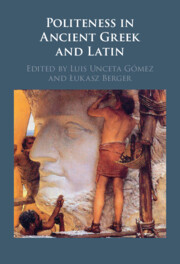Book contents
- Politeness in Ancient Greek and Latin
- Politeness in Ancient Greek and Latin
- Copyright page
- Contents
- Figures and Tables
- Contributors
- Preface
- Abbreviations
- Part I Introduction
- Part II The Expression of Im/Politeness
- Part III Im/Politeness in Use
- Chapter 6 Friendship Terms in Plato
- Chapter 7 Conversational Openings and Politeness in Menander
- Chapter 8 Im/Politeness of Interruptions in Roman Comedy
- Chapter 9 Im/Politeness and Conversation Analysis in Greek Tragedy
- Chapter 10 Qui Honoris Causa Nominatur
- Chapter 11 Banter, Teasing and Politeness in Varro’s De Re Rustica
- Part IV Ancient Perceptions on Im/Politeness
- Glossary
- References
- Index Rerum
- Index Locorum
Chapter 10 - Qui Honoris Causa Nominatur
Form and Function of Third-Party Politeness in Cicero*
from Part III - Im/Politeness in Use
Published online by Cambridge University Press: 08 September 2022
- Politeness in Ancient Greek and Latin
- Politeness in Ancient Greek and Latin
- Copyright page
- Contents
- Figures and Tables
- Contributors
- Preface
- Abbreviations
- Part I Introduction
- Part II The Expression of Im/Politeness
- Part III Im/Politeness in Use
- Chapter 6 Friendship Terms in Plato
- Chapter 7 Conversational Openings and Politeness in Menander
- Chapter 8 Im/Politeness of Interruptions in Roman Comedy
- Chapter 9 Im/Politeness and Conversation Analysis in Greek Tragedy
- Chapter 10 Qui Honoris Causa Nominatur
- Chapter 11 Banter, Teasing and Politeness in Varro’s De Re Rustica
- Part IV Ancient Perceptions on Im/Politeness
- Glossary
- References
- Index Rerum
- Index Locorum
Summary
The role of third-party politeness, in the sense of (im)politeness that pertains not (primarily) to the face of the addressee but is aimed at the face of a third party, has not received much attention in politeness studies, but plays an important role in public interaction in the Late Roman Republic. Both in private letters, which often circulated in a wider circle, and in speeches we find courtesies to or critical remarks about ‘others’ that were clearly meant to be heard or read by the persons involved. As such, third-party politeness appears to have been one of the complicated ways in which the Roman elite maintained and shaped their social relations. After a brief discussion of the various forms of third-party politeness, three case studies, concerning Cicero’s relations with Vatinius, Appius and Dolabella, serve as a first exploration of the phenomenon. It turns out that third-party politeness can be used to fulfil the same interpersonal functions which were discussed by Hall (2009) with regard to addressee-oriented politeness, viz. affiliative politeness, politeness of respect and compensation for FTAs.
- Type
- Chapter
- Information
- Politeness in Ancient Greek and Latin , pp. 249 - 272Publisher: Cambridge University PressPrint publication year: 2022

